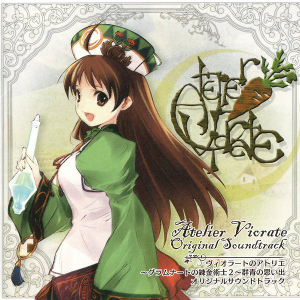Atelier Viorate -Memories of Ultramarine- Original Soundtrack
 |
Album Title: Atelier Viorate -Memories of Ultramarine- Original Soundtrack |
| Record Label: Team Entertainment |
|
| Catalog No.: KDSD-10056/7 |
|
| Release Date: February 2, 2011 |
|
| Purchase: Buy at CDJapan |
Overview
Following the port of Atelier Judie, Gust decided to port the other game in the Gramnad saga, Atelier Viorate, for the PSP. The original game’s soundtrack was one of the series’ best, highlighting an organic flavour with compositions by Ken Nakagawa, Daisuke Achiwa, and Akira Tsuchiya. The PSP port largely preserved its sound, though added a handful of new instrumental and vocal themes. The expanded soundtrack was released by Team Entertainment and those who purchased the first press even got a music book.
Body
The album starts off surprisingly with a bang. “Gaze Out Over the Sea” is like no Atelier tune I’ve ever heard and I’m happy to say that! It does use some instrumentation like flutes and ancient percussion that other Atelier soundtracks have used but the rest is completely new. It features both bagpipes and vocals filled with fast-paced grace notes. The singing is unique and powerful especially in the chorus. Though the bagpipe has been heard before in the series, it hasn’t been heard as clearly and as beautifully as this. The result is a very enchanting piece. Equally remarkable is “Beneath This Blue Sky”, one of the series’ best-loved vocal themes.
The team maintained this organic approach throughout the scenic tracks on the soundtrack. Indeed, the bagpipe melody from the opening theme carries over to “Number One Daughter of Carrot Village”. It isn’t as powerful a piece, but it’s also a nice addition. The bagpipe also carries on to other tunes like in “Harbor of the Great God”, “The Rainbow Snake”, and “Gothic”. Bagpipes and Uilleann pipes really are all over the place, and every track that uses them seems to have gotten extra special attention. I hope you like their distinctive sounds!
There is nevertheless quite a lot of diversity in the soundtrack. It’s interesting that, after a track like “Gaze Out Over the Sea” that there would be a techno track like “The Manual for Developing a Perfect Village”. I’m really not much of a fan of the random techno, especially after hearing the potential of the more organic tracks. That said, there are some more crazy electronic tracks like “The Afternoon of the Supersonic Hydro Catfish” that sounds almost like it is going to use electric bagpipe in this one. It is just so weird that I kind of like it. There are still some sillier tracks like “Thud” that aren’t bad at all, but are veering more towards that filler side. There are also short tracks like the battle completion songs that most would expect from a full soundtrack.
While this new release is dedicated to the PSP version, the sheer majority of the music is identical to the PlayStation 2 version of the soundtrack — there isn’t any remastering to speak of. That said, there are three new instrumental tracks on the end of the first disc. “Teasing Not Allowed” is a nice whimsical track, while “Memory of Lapis Lazuli” creates a nostalgic and calming sound, though none of these are long enough to make a major impact. More impressive are the two new vocal themes at the end of the soundtrack. While “Wind-Up Happy Clock” is little more than a gimmick, “celestial ark” is a fully-fledged theme featuring a charismatic performance and upbeat pop-flavoured accompaniment.
Summary
It’s amazing how the Atelier series consistently goes so strongly in the musical department. In their debut as the new Gust Sound Team, Ken Nakagawa, Daisuke Achiwa, and Akira Tsuchiya do an even more appealing job than previous Atelier scores. What ensures the album stands up alongside its predecessors is that there is such a large amount of high quality tracks that there is plenty to choose from. The reprint is particularly enjoyable, thanks to its lavish presentation and extra vocal theme, though those who owned the previous soundtrack release won’t have a reason to get this one.
Do you agree with the review and score? Let us know in the comments below!
4
Posted on August 1, 2012 by Charles Szczygiel. Last modified on January 22, 2016.














